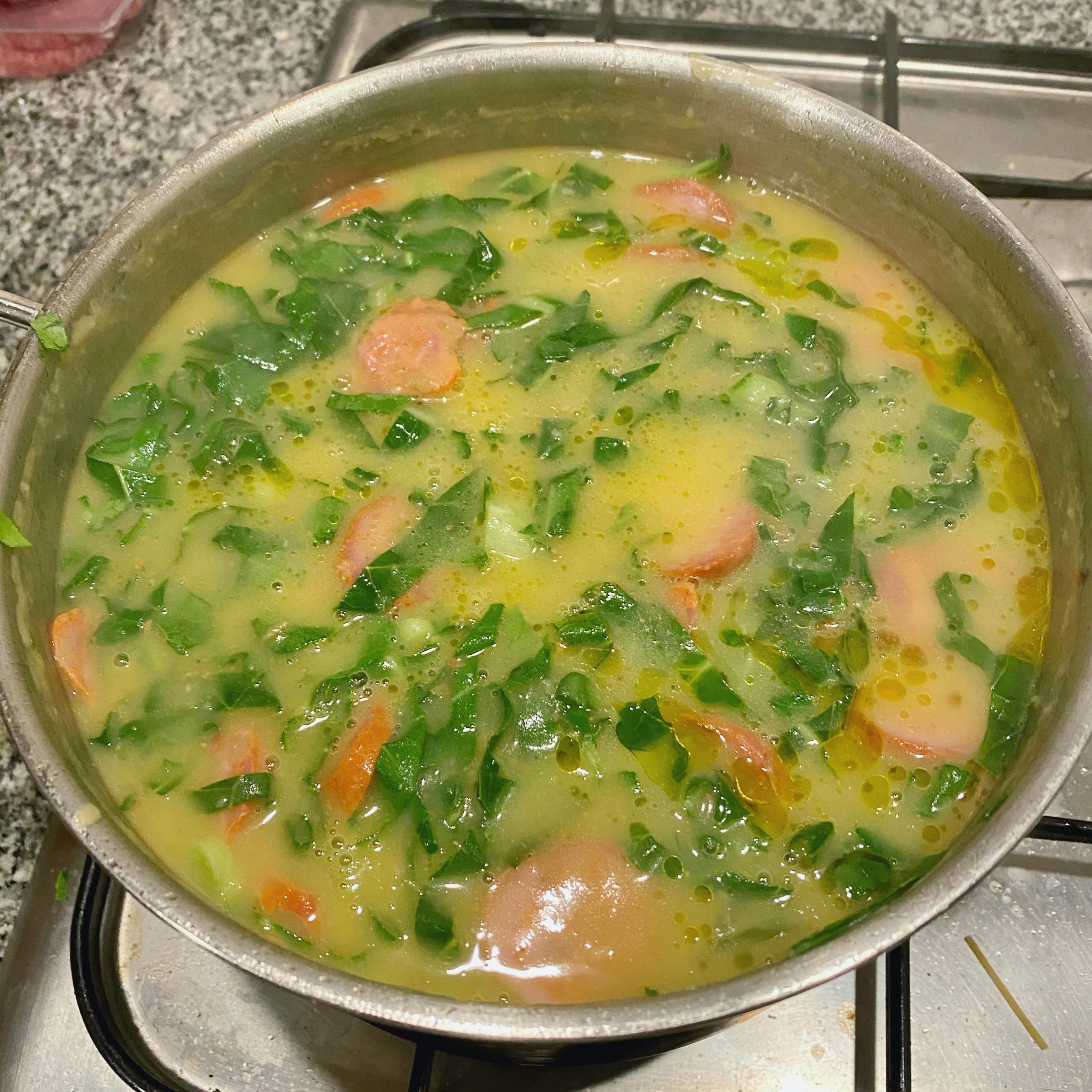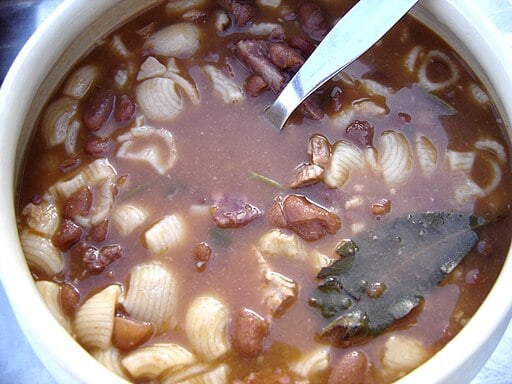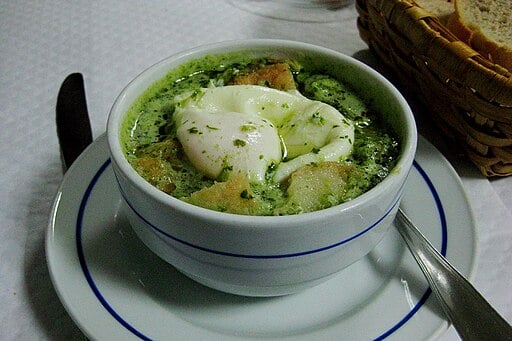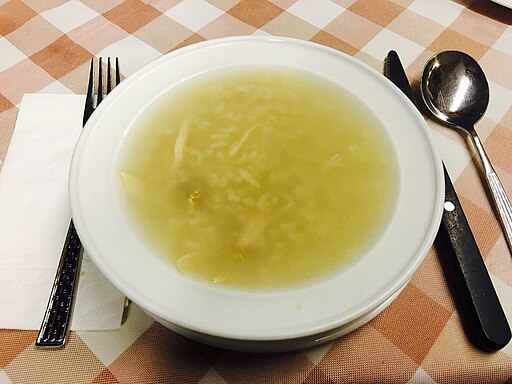Portuguese soup – who knew that this was a thing? But the moment that you step into a Portuguese supermarket and reach the soup section, suddenly it hits you – the Portuguese take their soup seriously – and seriously love it! From the coast to the mountains, each region of Portugal has its own specialty – soup that warms the body and comforts the soul, especially in the colder months. Beyond the nourishment that soup provides, it also tells the story of survival, solidarity and ingenuity through the years. Let’s explore some of Portugal’s best soups, with recipes and a brief history behind each one.
Caldo Verde
The Soul of the North
Few soups are as emblematic of Portugal as Caldo Verde. Born in the hills of the Minho, this soup of kale, potatoes, onions, and chorizo is a symbol of resilience. It was the soup of the peasants, made with whatever was at hand, simple but robust. Often served at parties and celebrations, it is now an icon of Portuguese gastronomy.
Recipe
Ingredients
- 1 large onion, chopped
- 2 cloves garlic, minced
- 4 medium potatoes, peeled and diced
- 1/4 cup olive oil (plus more for drizzling)
- 6 cups vegetable broth or water
- 4 cups kale or collard greens, finely shredded
- 1 or 2 vegetarian sausages (optional, sliced thinly for added texture)
- Salt and pepper to taste
Instructions
- In a large pot, heat the olive oil over medium heat. Add the chopped onion and garlic, sautéing until they become soft and translucent, about 5 minutes.
- Add the diced potatoes to the pot and pour in the vegetable broth (or water). Bring to a boil, then reduce the heat and simmer until the potatoes are very soft, about 15-20 minutes.
- Using an immersion blender (or regular blender), blend the potato mixture until smooth.
- Return the pot to low heat and add the finely shredded kale or collard greens. Let them simmer for about 10-15 minutes until tender.
- If using vegetarian sausage, add the thinly sliced pieces into the soup and cook for a few more minutes until heated through.
- Season the soup with salt and pepper to taste. Serve hot, with a drizzle of olive oil on top and some crusty bread on the side.

Sopa da Pedra
A Tale of Generosity
Legend has it that this soup originated from a poor monk who, with a stone, managed to convince the villagers to share their ingredients. Sopa da Pedra (literary “stone soup”), from the Almeirim region, became famous for its richness and flavor. Today, the soup combines beans, sausages, potatoes and other ingredients, but the stone, a symbol of humility and creativity, is still present in many versions.
Recipe
Ingredients
- 1 large onion, chopped
- 2 cloves garlic, minced
- 2 medium potatoes, diced
- 1 carrot, sliced
- 1/2 small cabbage, shredded
- 1 cup white beans (canned or cooked)
- 1/2 cup diced tomatoes (canned or fresh)
- 1 bay leaf
- 1/4 cup olive oil
- 4 cups vegetable broth or water
- Salt and pepper to taste
- 1 vegetarian sausage (optional, sliced)
- 1 small stone (optional, for tradition and fun)
Instructions
- Heat the olive oil in a large pot over medium heat. Add the onion and garlic, sautéing until soft and fragrant, about 5 minutes.
- Add the diced potatoes, carrot, and cabbage to the pot. Stir in the diced tomatoes, bay leaf, and vegetable broth (or water). Bring the soup to a boil, then reduce the heat and let it simmer for about 20 minutes, until the vegetables are tender.
- Stir in the white beans and the vegetarian sausage slices (if using), and cook for another 5-10 minutes until everything is heated through.
- Remove the bay leaf and season the soup with salt and pepper to taste.
- If you want to keep with the tradition, clean and place a small stone in the pot before serving (optional). Ladle the soup into bowls, and enjoy it with some crusty bread.

Açorda Alentejana
An Earthy Taste
The Alentejo is known for its arid climate and vast plains. Açorda, a soup made from bread (usually old), garlic, olive oil and herbs, was born from the need to do a lot with a little. Its simplicity hides a complexity of flavors, which can be complemented with poached eggs or even fish.
Recipe
Ingredients
- 4 slices of stale rustic bread (preferably crusty bread)
- 4 cloves garlic, minced
- 1 bunch fresh cilantro, chopped
- 1/4 cup olive oil
- 4 cups water
- Salt to taste
- 4 eggs (one per serving)
- A pinch of paprika (optional)
Instructions
- In a pot, heat the olive oil over medium heat. Add the minced garlic and sauté for a minute until fragrant but not browned.
- Add the water to the pot and bring it to a gentle simmer. Season with salt to taste and half of the chopped cilantro. Let the broth simmer for about 5 minutes to infuse the flavors.
- Crack the eggs into the simmering broth one at a time and poach them gently for about 3-4 minutes until the whites are set but the yolks remain runny.
- In individual serving bowls, place a slice of stale bread in each. You can tear the bread into smaller pieces if you prefer.
- Ladle the hot broth and poached eggs over the bread slices in each bowl. Sprinkle the remaining cilantro on top, and optionally add a pinch of paprika for extra flavor.
- Drizzle a bit more olive oil on top and serve immediately.

Ericeira Fish Soup
The Sea on Your Table
In the fishing village of Ericeira, fish soup is a real delicacy. Made with fresh fish from the Atlantic, this soup is a reflection of life on the Portuguese coast. The combination of fish, tomatoes, onions and peppers creates a robust and fragrant soup, perfect for warming up after a day’s fishing.
Recipe
Ingredients
- 500g (1 lb) white fish fillets (e.g., cod, hake, or sea bass), cut into chunks
- 1 large onion, chopped
- 2 cloves garlic, minced
- 2 ripe tomatoes, chopped
- 1 green bell pepper, chopped
- 2 medium potatoes, diced
- 1 bay leaf
- 1/4 cup olive oil
- 1.5 liters (6 cups) fish stock (or water)
- 1/2 cup white wine (optional)
- Fresh parsley, chopped
- Salt and pepper to taste
- 1 lemon (for serving)
Instructions
- In a large pot, heat the olive oil over medium heat. Add the chopped onion, garlic, and green bell pepper, sautéing until softened, about 5 minutes.
- Stir in the chopped tomatoes and cook for another 3-4 minutes until the tomatoes break down and release their juices.
- Add the diced potatoes, bay leaf, and fish stock (or water). Bring the soup to a boil, then reduce the heat and let it simmer for 15-20 minutes until the potatoes are tender.
- Gently add the chunks of fish and the optional white wine to the pot. Simmer for an additional 5-7 minutes, or until the fish is cooked through and flakes easily.
- Remove the bay leaf and season the soup with salt and pepper to taste. Stir in the fresh parsley for extra flavor.
- Ladle the soup into bowls and serve with a lemon wedge on the side for squeezing over the fish, which enhances the flavors. Optionally, serve with some crusty bread.
Canja
In Illness and in Health
Canja (Portuguese chicken soup) is a comforting soup, often associated with moments of illness or recovery. Made from chicken, rice and mint (or pennyroyal), this soup has its origins in ancient times, but is still a guaranteed presence in Portuguese kitchens today, especially on winter evenings.
Recipe
Ingredients
- 1 whole chicken breast (or 2 chicken thighs)
- 1 medium onion, chopped
- 2 cloves garlic, minced
- 1 bay leaf
- 1 cup white rice (short or long grain)
- 6 cups water or chicken broth
- Salt and pepper to taste
- Fresh parsley, chopped (for garnish)
- Lemon wedges (for serving, optional)
Instructions
- In a large pot, combine the chicken, chopped onion, minced garlic, and bay leaf. Add the water or chicken broth and bring to a boil. Reduce heat to a simmer and cook the chicken for about 25-30 minutes, until tender and cooked through.
- Once the chicken is cooked, remove it from the pot and set aside to cool slightly. Shred or chop the chicken into bite-sized pieces.
- Add the rice to the pot with the broth and simmer for about 15-20 minutes, or until the rice is fully cooked and tender.
- Return the shredded chicken to the pot and simmer for another 5 minutes to heat through. Taste and season with salt and pepper as needed.
- Ladle the soup into bowls, garnish with fresh parsley, and serve with lemon wedges on the side (optional), which can be squeezed over the soup for a fresh, tangy kick.

Over and Out
Portugal’s soups are a portrait of life in the country. Simple but rich, they are born from the land and the needs of those who created them. With each one, we can feel the weight of tradition, the strength of the community, and the creativity of those who knew how to create unforgettable dishes with just a few ingredients. From the warmth of Caldo Verde to the scent of the sea in fish soup, Portugal shows that a soup can be a world of stories on a plate. So the next time you’re in the Portuguese supermarket or hankering for a warm, hearty meal, why don’t you try a Portuguese soup?

